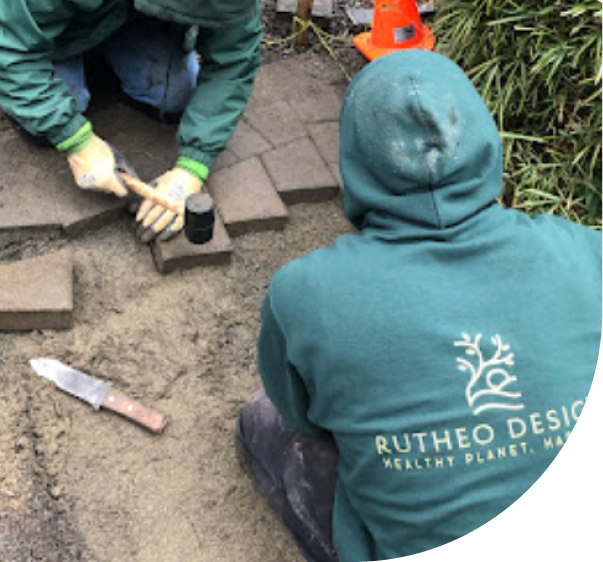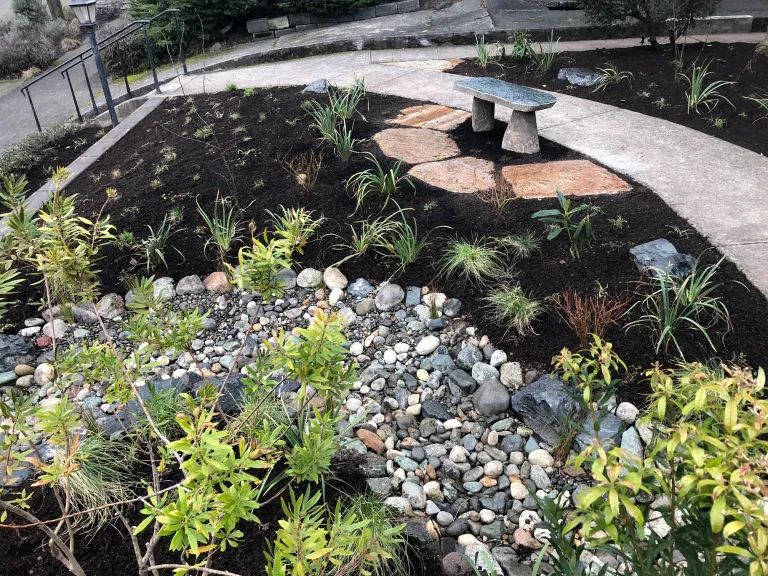
At Rutheo Designs, we create Japanese gardens that embody tranquility, balance, and sustainability, seamlessly integrating traditional design principles with the Pacific Northwest’s natural beauty. These gardens are thoughtfully crafted using asymmetry, negative space, and natural materials to evoke a sense of harmony. Stone pathways, water features, and carefully pruned trees define the structure, while native and climate-adapted plants ensure resilience in Seattle’s temperate climate. By incorporating sustainable practices such as rainwater harvesting, permeable hardscapes, and organic soil-building techniques, we design gardens that require minimal maintenance while fostering biodiversity.
Japanese gardens embrace an organic, flowing layout that mirrors nature rather than rigid geometric symmetry. The strategic placement of stones, plants, and water elements creates a dynamic yet peaceful space. Negative space (Ma) plays a crucial role in highlighting focal points and ensuring a sense of tranquility. Meandering pathways are designed to slow movement, inviting reflection and engagement with the landscape.
A fundamental aspect of Japanese garden design is simplicity. By reducing unnecessary ornamentation and focusing on natural materials, the garden fosters a serene and uncluttered aesthetic. A carefully curated plant palette ensures cohesion, and clean lines in pathways, water features, and structures enhance the meditative quality of the space. Every element is intentionally placed to create a harmonious flow, making it a distinctive yet complementary approach alongside other garden design styles such as minimalist, cottage, or modern landscapes.
Japanese gardens use symbolism to represent elements of the natural world. Rocks and stones often symbolize mountains, islands, or spiritual concepts, while water features reflect impermanence and renewal. Lanterns, bridges, and stepping stones serve both functional and symbolic purposes, marking transitions and reinforcing themes of movement, reflection, and serenity.
Stones provide structure, define pathways, and anchor visual elements within the garden. Natural boulders mimic the ruggedness of mountains, while stepping stones guide movement in an intentional, contemplative manner. Dry gardens (karesansui) use raked gravel to symbolize rippling water, offering a space for meditation and artistic expression.
Water plays a vital role in Japanese garden design, introducing movement and sound. Ponds and streams create a reflective surface that enhances depth and light play, while waterfalls add an auditory element of serenity. Traditional water basins (tsukubai), often found in tea gardens, symbolize purification and mindfulness.
Seattle’s climate makes it well-suited for many traditional Japanese garden plants. Evergreen trees such as pines and camellias provide year-round structure, while cherry blossoms and azaleas add seasonal beauty. Bamboo and moss offer texture and contrast, thriving in the region’s cool, damp conditions.
Stone lanterns (tōrō) are strategically placed to provide soft, ambient lighting and cultural authenticity. Tea houses or small pavilions create spaces for contemplation, integrating traditional craftsmanship with natural surroundings. Torii gates and wooden fences establish boundaries and transitions, reinforcing the sense of enclosure and movement through the space.
A sustainable Japanese garden in Seattle benefits from the use of native and climate-adapted plant species. By selecting plants that thrive in the region’s cool, wet winters and dry summers, we reduce maintenance and resource consumption. Incorporating Pacific Northwest species that blend with traditional Japanese aesthetics supports biodiversity and local ecosystems.
Thoughtful water management is essential in a sustainable garden. Self-sustaining ponds with recirculating systems reduce water waste while maintaining the calming presence of water. Rain gardens and permeable pathways enhance drainage, preventing excess runoff. Gravel beds and sand filtration naturally cleanse water features, preserving ecological balance.
Sustainability extends to the selection of materials. Reclaimed stone and wood add natural beauty while minimizing environmental impact. Locally sourced bamboo provides an eco-friendly option for privacy screens and decorative elements. Instead of concrete, we incorporate natural clay or gravel surfaces, reducing the carbon footprint and promoting permeability.

At Rutheo Designs, we are dedicated to transforming your outdoor spaces into beautiful, sustainable landscapes that reflect your vision and the unique character of the Seattle area. We offer services in native plant landscaping, water-efficient irrigation, custom landscape design, and hardscaping solutions tailored to your goals and the local environment. Every project is unique, and we take the time to listen to your needs and offer personalized solutions that align with both your aspirations and Seattle’s natural surroundings.
We invite you to reach out to us to start the conversation about your landscaping needs. You can contact us by email at connect@rutheodesigns.com or give us a call at (360) 844-2989. Whether you have specific questions or are ready to schedule a consultation, we’re eager to help you bring your outdoor vision to life with the care and expertise that Rutheo Designs is known for.